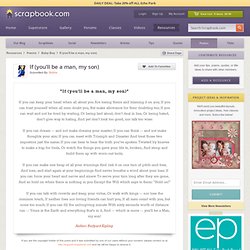

I Know Why The Caged Bird Sings by Maya Angelou. Do not stand at my grave and weep - Wikipedia, the free encyclopedia - StumbleUpon. Do Not Stand at My Grave and Weep is a poem written in 1932 by Mary Elizabeth Frye.

Although the origin of the poem was disputed until later in her life, Mary Frye's authorship was confirmed in 1998 after research by Abigail Van Buren, a newspaper columnist.[1] Full text[edit] Do not stand at my grave and weep, I am not there; I do not sleep. Love of the Storm. Poem: If (you'll be a man, my son) "If (you'll be a man, my son)" If you can keep your head when all about you Are losing theirs and blaming it on you; If you can trust yourself when all men doubt you, But make allowance for their doubting too; If you can wait and not be tired by waiting, Or being lied about, don't deal in lies, Or being hated, don't give way to hating, And yet don't look too good, nor talk too wise: If you can dream -- and not make dreams your master; If you can think -- and not make thoughts your aim; If you can meet with Triumph and Disaster And treat those two impostors just the same; If you can bear to hear the truth you've spoken Twisted by knaves to make a trap for fools, Or watch the things you gave your life to, broken, And stoop and build them up with worn-out tools; Author: Rudyard Kipling.

Drummer Hodge by Thomas Hardy. Portfolio: yertle.